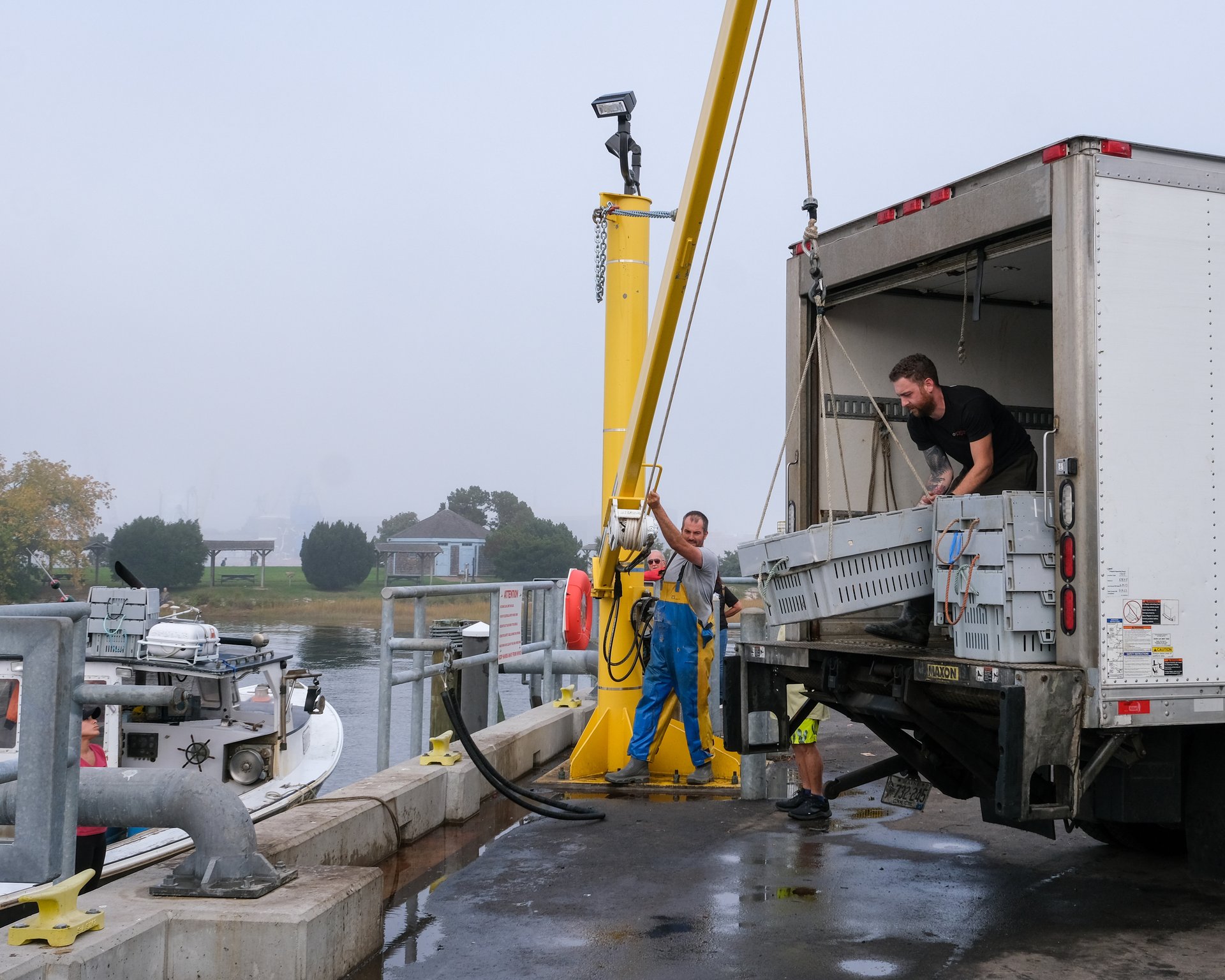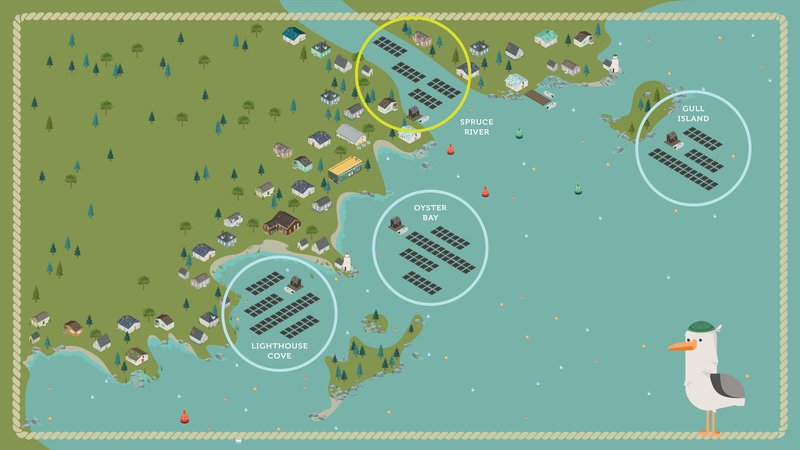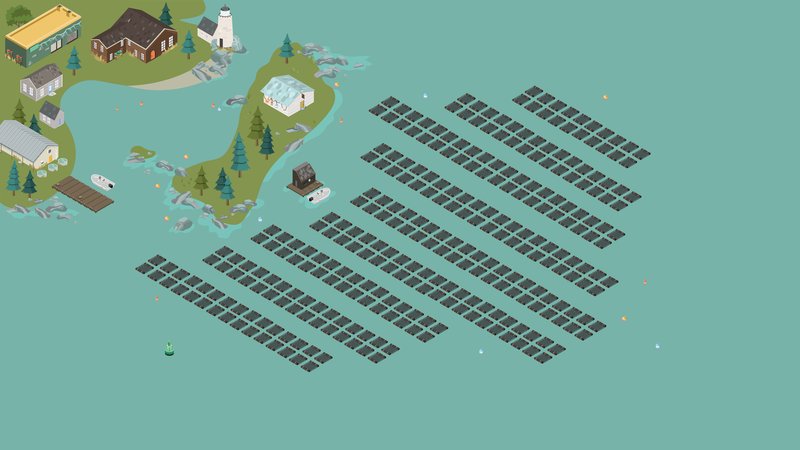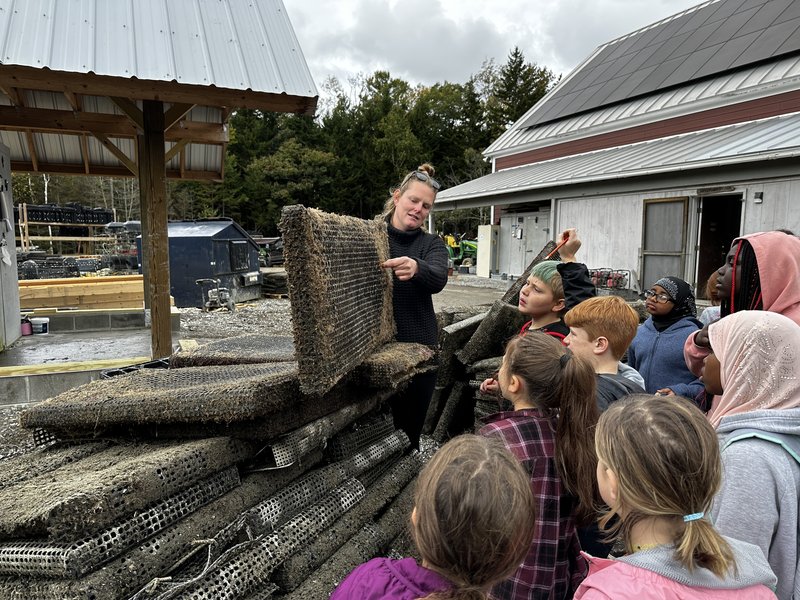Building a Healthy Blue Economy Workforce
Perspectives | Oct 13, 2023
A vital workforce is central to a thriving blue economy. By equipping more people with the necessary skills to enter and succeed in that workforce, we can ensure the prosperity of marine businesses and the coastal economies they comprise. Read on to explore our cross-organizational effort to support the growth of our blue economy workforce.

The health of any industry hinges on the strength of its workforce, especially in the evolving industries that form the backbone of our emerging blue economy. Whether it’s an aquaculture farmer learning to adapt to changing climates, data science experts keeping up with rapidly advancing technology, or business leaders seeking the future of innovation, these highly-skilled professionals are hard to find and retain. At GMRI we are addressing challenges surrounding workforce development in the blue economy through a variety of programs that invest in people of all ages — from students to early-career professionals and beyond. By sparking interest, nurturing talent, providing valuable resources, and fostering innovation, GMRI is contributing to the growth and sustainability of the Gulf of Maine's blue economy in a comprehensive way.
Supporting the Leaders of Tomorrow
A thriving future blue economy requires providing today’s youth with access to essential knowledge and skills they will need to work the jobs of tomorrow. GMRI offers a suite of educational experiences that support students in developing expertise in data and computer science — disciplines widely regarded as essential knowledge for economic opportunity and social mobility — through the lens of Maine’s growing blue economy. This early investment in climate science, computer science, complex systems thinking, and modeling will set today’s youth up for successful careers in fields that are facing the foremost challenge of our time — climate change.
One example of our efforts to support the development of young learners’ data and computer science expertise arises from a collaboration between our Learning Sciences Lab, led by Dr. Amanda Dickes, our Coastal and Marine Economics Lab, led by Dr. Kanae Tokunaga, and our Aquaculture Program, led by Carissa Maurin.
This interdisciplinary team developed an online aquaculture game designed for students between third and sixth grade. Principles of data science and economics serve as cornerstones of the game design, providing students opportunities to build and manage their own virtual aquaculture farms.



Throughout the game, students make critical decisions about farm management in response to environmental, technical, and even financial challenges. On real farms, aquaculturists make difficult choices by using any available production, financial, and environmental data to evaluate potential benefits, costs, and risks. By situating those choices — and the data which inform them — within an interactive game, Amanda, Kanae, and Carissa have developed a tool that helps students become critical systems thinkers and highlights aquaculture as a career option for young Mainers.
Preparing the next generation of ecosystem stewards requires developing a robust and early foundation of scientific and mathematical expertise in our youth. This game is just one example of how embedding essential knowledge and practices – such as data and climate science, within consequential and meaningful contexts can prepare students for success throughout their academic career and beyond.
Amanda Dickes, Ph.D. Learning Scientist

This innovative online tool builds on nearly two decades of LabVenture, which has provided over 155,000 kids (and counting) from across the state of Maine with the opportunity to engage in a hands-on, interactive, authentic investigation of the changing Gulf of Maine ecosystem. Students engage with authentic tools of science and methods of inquiry to explore many of the same questions about the Gulf of Maine that research scientists at GMRI are addressing.
LabVenture gives students from every corner of Maine the opportunity to explore the very same questions our GMRI research scientists are exploring in our changing Gulf of Maine. It exposes them to the ways data helps us learn more about the systems that surround us whether they are from a fishing family, a farming community, or any of the other important ecosystems in Maine.
Meredyth Sullivan LabVenture Senior Program Manager
Continuing Support in the Workforce Pipeline
Our work to support a robust pipeline of skilled blue economy workers doesn’t stop with elementary and middle schoolers. Across departments and with the support of external partners, our staff collaborate to provide trainings, workshops, and resources for older students and early-career professionals looking to take the next steps in their ocean-focused careers.
For example, in partnership with the Maine Aquaculture Association, Educate Maine, and Southern Maine Community College (SMCC), Carissa designed and launched a first-of-its-kind aquaculture apprenticeship program to support those looking to develop skills in the shellfish and seaweed farming industries. The apprenticeship is a paid work experience through which apprentices gain aquaculture-specific skills through a combination of on-the-job learning, mentorship, networking, and supplemental classroom education.



Apprentices take on 144 hours of classroom education at SMCC and have the opportunity to work 2,000 paid hours for real farms over the course of one year. Experienced mentors guide the apprentices through these hours, providing focused instruction on a variety of skills. Throughout the experience, apprentices learn about organizational and safety protocols, vessel and vehicle operation, use and maintenance of tools and equipment, shellfish and seaweed production, management, and health, and food safety and regulatory compliance.
Workforce training programs are fundamental to the sustainable growth of the industry. Critical feedback from Maine’s aquaculture farmers allowed us to identify gaps in existing training programs and create the Maine Aquaculture Workforce Development Strategy where we provided recommendations for developing a robust and cohesive aquaculture training system, including the creation of the Maine Aquaculture Apprenticeship Program.
Carissa Maurin Aquaculture Program Manager
The apprenticeship program builds on longstanding efforts of our seafood team, which provides local seafood industry workers with trainings, workshops, and resources to help them compete in a massive global seafood marketplace. For example, as a part of our seafood team’s recent efforts to provide clarity around Atlantic bluefin tuna in the Gulf of Maine, they hosted local fishermen, dealers, chefs, and GMRI scientists for Tuna School, an educational (and tasty) part of our ongoing Trawl to Table series.
Boosting Businesses
The rapidly evolving blue economy landscape is loaded with startups and industry leaders seeking innovative ocean-based solutions to complex challenges, but access to investment opportunities, niche training programs, aggregated resources, and scaling support can be hard to come by. Across our organization, we know that providing this kind of support to these businesses and leaders is essential to the health of our blue economy workforce.
For example, Maine's burgeoning aquaculture sector benefits from a robust network of support from state agencies, non-governmental entities, research institutions, academic establishments, trade associations, and various stakeholders committed to unlocking the state's economic potential in aquaculture. Despite the abundant resources offered by these organizations and the farms themselves, the sheer volume of information poses a challenge for farmers to find answers to their questions.
The Maine Aquaculturist effectively addresses this issue by centralizing and organizing these resources to increase their accessibility. This streamlines the process for farmers to efficiently retrieve essential information to support the establishment, growth, and sustainability of their farms.
The Maine Aquaculturist empowers our industry by saving valuable time that would otherwise be spent sifting through a sea of information and resources. It allows our aquaculture workforce to focus on what truly matters — enhancing their business models, engaging in gear swaps, and finding new job opportunities. It's a catalyst for workforce development, and enables the industry to grow and adapt alongside our evolving blue economy.
Carissa Maurin Aquaculture Program Manager
This free-to-use online resource, managed by Carissa, offers a wealth of comprehensive and practical information to both newcomers and established aquaculture professionals alike.
Our Gulf of Maine Ventures team is leading additional work that supports the blue economy workforce in two important ways. First, they are providing technical, financial, and scaling support to entrepreneurs. The innovative technologies these businesses are developing make it easier for workers in the blue economy to do their jobs by introducing operational efficiencies, reducing costs, and mitigating a myriad of business risks. One such company is BlueTrace, which offers a traceability solution for shellfish harvesters, growers, distributors, and dealers. Their Tagging and Distributor apps enable organizations to optimize their activities, comply with regulations, and keep up with their inventory. Their product minimizes manual processes, supports producers and distributors to increase their efficiency and reduce their costs, and decreases recall times for diseases and other product issues (which often have massive impacts on company finances, reputation, etc.).
The Ventures team is also expanding workforce opportunities for people not yet involved in blue economy industries, whether they have working waterfront experience or not. They’ve created and launched a BlueTech Boost program, which is a 10-week incubator program designed to help founders overcome hurdles and reach specific milestones. The team provides direct mentor support, connects founders with GMRI subject-matter experts, and supplements businesses with micro-grant funding to help move founders along the pathway towards growth.
It is crucial for technical innovators to design products and services that align with the needs of end users, which frequently include fishermen, farmers, and others. Our role is to facilitate the alignment of products with the market, uncover pilot and R&D opportunities, and ultimately determine the scalability of these ventures.
Lucy Barrett Senior Manager, Innovation and Entrepreneurship, GMRI
The blue economy in the Gulf of Maine contributes millions of dollars and good jobs to the working waterfront, but as these industries that have supported our coastal communities evolve, we need to take action to ensure the workforce remains strong — especially in the face of climate change. Across our organization, our staff are addressing this challenge through programs that serve the next generation of blue economy workers.



